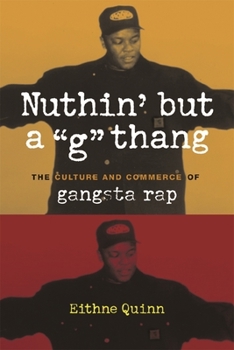Nuthin' But a "G" Thang: The Culture and Commerce of Gangsta Rap
Select Format
Select Condition 
Book Overview
In the late 1980s, gangsta rap music emerged in urban America, giving voice to--and making money for--a social group widely considered to be in crisis: young, poor, black men. From its local origins, gangsta rap went on to flood the mainstream, generating enormous popularity and profits. Yet the highly charged lyrics, public battles, and hard, fast lifestyles that characterize the genre have incited the anger of many public figures and proponents...
Format:Paperback
Language:English
ISBN:0231124090
ISBN13:9780231124096
Release Date:November 2004
Publisher:Columbia University Press
Length:264 Pages
Weight:0.84 lbs.
Dimensions:0.8" x 6.0" x 8.9"
Customer Reviews
2 ratings
Unintentionally Proves The Point
Published by Thriftbooks.com User , 17 years ago
This encyclopaedic examination of "gangsta rap" culture states that the "movement" is a viable culture not only in the nation but within black society. I've been mistaken - I was convinced that the dumb spelling, childish slogans, ridiculous speech and obsession with obscenities was simply a marketing device. I now know that talking, writing and acting like semi-literate folks "normal". The author takes it further: It is to be admired and praised as simply another expression of black/street culture. This "culture" reinforces every stereotype - uneducated, violent, obscene, criminal, lazy, irresponsible. The author asserts that gangsta rap genuinely describes the contemporary black experience for large numbers of folks. If so, the future is bleak indeed. We've all seen white & Latino kids trying to identify - rapping the words, dressing childishly, talking in that unintelligible shortcut speech accompanied by hilariously absurd hand gestures. Yet one knows it's an act. No one, especially black Americans, take them seriously. At any time they can re-enter modern society - lose the attitude, change to adult clothes adn speak normally. Those in the "gangsta" world may not have this option and that is sad. (The author would probably disagree.) We get a tremendous amount of data supporting his thesis. Sadly, he may be correct. Gangsta rap dumbs down culture, offering a childish simplicity without complexity. Musicians cannot read, play or compose, entertainment is mindless, language is replaced with childish babble. "Western" values of education, thrift, hard work, morality, family and planning have been replaced by "street knowledge", living for the moment, criminal "heroes", gangs and an incredible ignorance of the modern world - from science to history to politics. It is a devestating indictment that is punctuated by the success of immigrants who adoped "Western" values and have flourished despite the many obstacles. The question is not who can rap the baddest, has more street cred, sells more CDs, has better drugs or wears more bling. No, the question should be: Who will teach the children, heal the sick, fix the lights, repair the roads, deliver the mail, run the internet or produce BET? These basic societal functions are, of course, the ones that require so-called "Western" values. If we all lived the way the "heroes" do, where would we be then? No one in their right mind would choose this lifestyle for their child or family - it's a cultural death wish. This is an uneasy book, one that disturbs and leaves one depressed for the future.
An interesting interdisciplinary study
Published by Thriftbooks.com User , 18 years ago
The author explores the genesis and maturation of Los Angeles-based gangsta music and culture during the post-Civil Rights era. She ties the genesis of gangsta to the time when the U.S. manufacturing economy shifted to a service based economy, urban areas were neglected and the neoconservative policies of the Reagan/Bush era redistributed the nation's wealth to a small group at the top. Theoretically this wealth would then "trickle down" and I suppose it did, though in the form of low paying, dead end service jobs for those who used to be skilled and semiskilled laborers. Her study ends in 1996, where the centrist policies of the Clinton administration did little to ameliorate the problems of which gangstas rap, and classic gangsta artists are mellowing. (And not coincidentally, the year Tupac Shakur, a child of Black Power parents, died in a drive-by shooting.) The generation of young black men coming of age in places like Compton during this time saw only social immobility in the Land of Opportunity, so they created their own opportunities on their own terms. The irony, as she points out, is that gangsta is both a commentary on and child of the rampant free-market 1980's and `90s: ruthless, exploitative, unabashedly commercial, individualistic, hustling. (So is it really any surprise that here in the 21st century, Lee Iacocca gets jiggy with Snoop Dog for Chrysler commercials?) This is an interesting interdisciplinary study of gangsta's texts and contexts, its academic commentators and its diverse opponents. While neither defending nor dismissing gangsta as the latest incarnation of the minstrel show stereotypes (like Stanley Crouch and others ) she demonstrates that it is rife with black archetypes which participate in some very old expressive repertoires. And she looks forward beyond 1996 by mentioning "Barbershop" in which Ice Cube's character has learned the value of community and non-materialism. Those unfamiliar with the jargon of cultural studies might find themselves confused on occasion (I admit I did) but will also find that things clarify themselves with further reading. I recommend this for anyone interested in African American music and cultural studies.





